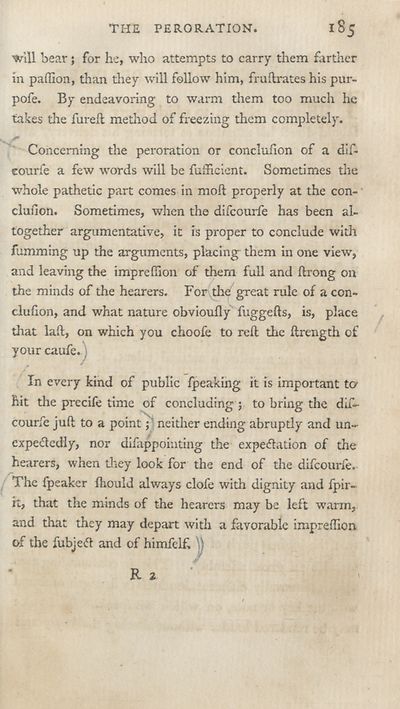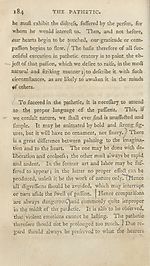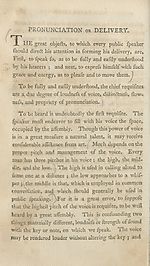Download files
Complete book:
Individual page:
Thumbnail gallery: Grid view | List view

THE PERORATION.
1S5
will bear; for he, who attempts to carry them farther
in paffion, than they will follow him, fruftrates his pur-
pofe. By endeavoring to warm them too much he
takes the fureft method of freezing them completely.
Concerning the peroration or conclufion of a dif-
eourfe a few words will be fufficient. Sometimes the
whole pathetic part comes in mod properly at the con¬
clufion. Sometimes, when the difcourfe has been al¬
together argumentative, it is proper to conclude with
fumming up the arguments, placing them in one view,
and leaving the impreffion of them full and ftrong on
the minds of the hearers. For the great rule of a con¬
clufion, and what nature obvioufly' fuggefts, is, place
that lad, on which you choofe to red the drength of
your caufe.)
In every kind of public fpeaking it is important to-
hit the precife time of concluding ; to bring the dif¬
courfe jud to a pointneither ending abruptly and un-
expe&edly, nor difappointing the expectation of the
hearers, when they look for the end of the difcourfe.
The fpeaker diould always clofe with dignity and fpir-
h, that the minds of the hearers may be left warm,
and that they may depart with a favorable impreflion
of the fubjeCt and of himfelf, \)
R z
1S5
will bear; for he, who attempts to carry them farther
in paffion, than they will follow him, fruftrates his pur-
pofe. By endeavoring to warm them too much he
takes the fureft method of freezing them completely.
Concerning the peroration or conclufion of a dif-
eourfe a few words will be fufficient. Sometimes the
whole pathetic part comes in mod properly at the con¬
clufion. Sometimes, when the difcourfe has been al¬
together argumentative, it is proper to conclude with
fumming up the arguments, placing them in one view,
and leaving the impreffion of them full and ftrong on
the minds of the hearers. For the great rule of a con¬
clufion, and what nature obvioufly' fuggefts, is, place
that lad, on which you choofe to red the drength of
your caufe.)
In every kind of public fpeaking it is important to-
hit the precife time of concluding ; to bring the dif¬
courfe jud to a pointneither ending abruptly and un-
expe&edly, nor difappointing the expectation of the
hearers, when they look for the end of the difcourfe.
The fpeaker diould always clofe with dignity and fpir-
h, that the minds of the hearers may be left warm,
and that they may depart with a favorable impreflion
of the fubjeCt and of himfelf, \)
R z
Set display mode to:
![]() Universal Viewer |
Universal Viewer | ![]() Mirador |
Large image | Transcription
Mirador |
Large image | Transcription
| Antiquarian books of Scotland > Languages & literature > Abridgement of lectures on rhetoric > (201) |
|---|
| Permanent URL | https://digital.nls.uk/135468866 |
|---|
| Description | Thousands of printed books from the Antiquarian Books of Scotland collection which dates from 1641 to the 1980s. The collection consists of 14,800 books which were published in Scotland or have a Scottish connection, e.g. through the author, printer or owner. Subjects covered include sport, education, diseases, adventure, occupations, Jacobites, politics and religion. Among the 29 languages represented are English, Gaelic, Italian, French, Russian and Swedish. |
|---|

